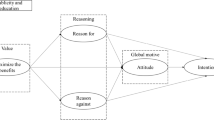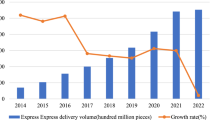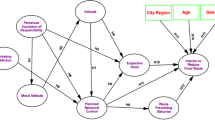Abstract
E-waste is becoming a concern due to its toxic content and serious pollution effect. Many studies have focused on the detrimental impacts of hazardous e-waste and extended producer responsibility for e-waste recycling. There is, however, a lack of case studies from the perspectives of consumers’ awareness of e-waste, and willingness to pay (WTP) for e-waste recycling. An e-waste management system cannot be efficient when consumers are not actively involved in. Based on a survey of 544 respondents in Ho Chi Minh City, this paper investigates the respondents’ WTP for e-waste recycling and factors affecting their WTP by integrating the theory of planned behaviour and the norm activation model. The Contingent Valuation Method and Tobit model were applied to estimate and explain consumers’ WTP for e-waste recycling. The model showed that subjective/social norms, moral/personal norms, inconvenience of recycling, perception of e-waste pollution, age, home ownership, and income significantly affected WTP for e-waste recycling. The estimated mean WTP from the Tobit model was 1.588% (Televisions), 1.644% (Computers) and 1.656% (Mobile phones) of the purchasing bills. The findings are useful for policy-makers in developing more effective environmental management policies for e-waste.


Similar content being viewed by others
References
Entele BR (2020) Analysis of households’ willingness to pay for a renewable source of electricity service connection: evidence from a double-bounded dichotomous choice survey in rural Ethiopia. Heliyon 6(2):e03332. https://doi.org/10.1016/j.heliyon.2020.e03332
Hossain MS, Al-Hamadani SM, Rahman MT (2015) E-waste: a challenge for sustainable development. J Health Pollut 5(9):3–11. https://doi.org/10.5696/2156-9614-5-9.3
Forti V, Balde CP, Kuehr R, Bel G (2020). The Global E-waste Monitor 2020: Quantities, flows and the circular economy potential (9280891146)
Thai NTK (2009) Hazardous industrial waste management in Vietnam: current status and future direction. J Mater Cycles Waste Manag 11(3):258–262. https://doi.org/10.1007/s10163-009-0239-3
Tran CD, Salhofer SP (2018) Analysis of recycling structures for e-waste in Vietnam. J Mater Cycles Waste Manag 20(1):110–126. https://doi.org/10.1007/s10163-016-0549-1
Hong TTN, Hung R-J, Lee C-H, Nguyen TT, H. (2019) Determinants of residents’ E-waste recycling behavioral intention: a case study from Vietnam. Sustainability 11(1):164. https://doi.org/10.3390/su11010164
Yoshida A, Terazono A, Ballesteros FC, Nguyen D-Q, Sukandar S, Kojima M, Sakata S (2016) E-waste recycling processes in Indonesia, the Philippines, and Vietnam: a case study of cathode ray tube TVs and monitors. Resour, Conservation Recycling 106:48–58. https://doi.org/10.1016/j.resconrec.2015.10.020
Song Q, Li J (2014) Environmental effects of heavy metals derived from the e-waste recycling activities in China: a systematic review. Waste manage 34(12):2587–2594. https://doi.org/10.1016/j.wasman.2014.08.012
Deng WJ, Giesy JP, So CS, Zheng HL (2017) End-of-life (EoL) mobile phone management in Hong Kong households. J Environ Manage 200:22–28. https://doi.org/10.1016/j.jenvman.2017.05.056
Luo C, Liu C, Wang Y, Liu X, Li F, Zhang G, Li X (2011) Heavy metal contamination in soils and vegetables near an e-waste processing site, south China. J Hazard Mater 186(1):481–490. https://doi.org/10.1016/j.jhazmat.2010.11.024
Gaidajis G, Angelakoglou K, Aktsoglou D (2010) E-waste: environmental problems and current management. J Eng Sci Technol Rev 3(1):193–199
Nguyen DQ, Ha VH, Eiji Y, Huynh TH (2017) Material flows from electronic waste: understanding the shortages for extended producer responsibility implementation in Vietnam. Procedia CIRP 61:651–656
Hicks C, Dietmar R, Eugster M (2005) The recycling and disposal of electrical and electronic waste in China—legislative and market responses. Environ Impact Assess Rev 25(5):459–471. https://doi.org/10.1016/j.eiar.2005.04.007
Song Q, Wang Z, Li J (2012) Residents’ behaviors, attitudes, and willingness to pay for recycling e-waste in Macau. J Environ Manag 106:8–16. https://doi.org/10.1016/j.jenvman.2012.03.036
Gurauskienė I (2008) Behaviour of consumers as one of the most important factors in E-waste problem. Environ Res, Eng Manage 46(4):56–65
Ananno A, Masud M, Dabnichki P, Meem MM, Chowdhury S (2021) Survey and analysis of consumers’ behaviour for electronic waste management in Bangladesh. J Environ Manage. https://doi.org/10.1016/j.jenvman.2021.111943
Hai HT, Hung HV, Quang ND (2017) An overview of electronic waste recycling in Vietnam. J Mater Cycles Waste Manage 19(1):536–544. https://doi.org/10.1007/s10163-015-0448-x
Nixon H, Saphores J-DM (2007) Financing electronic waste recycling Californian households’ willingness to pay advanced recycling fees. J Environ Manage 84(4):547–559. https://doi.org/10.1016/j.jenvman.2006.07.003
Islam MT, Dias P, Huda N (2021) Young consumers’e-waste awareness, consumption, disposal, and recycling behavior: a case study of university students in Sydney. Aust J Cleaner Prod 282:124490. https://doi.org/10.1016/j.jclepro.2020.124490
Nnorom I, Ohakwe J, Osibanjo O (2009) Survey of willingness of residents to participate in electronic waste recycling in Nigeria–a case study of mobile phone recycling. J Cleaner Prod 17(18):1629–1637. https://doi.org/10.1016/j.jclepro.2009.08.009
Song Q, Wang Z, Li J (2016) Exploring residents’ attitudes and willingness to pay for solid waste management in Macau. Environ Sci Pollut Res 23(16):16456–16462. https://doi.org/10.1007/s11356-016-6590-8
Wang Z, Zhang B, Yin J, Zhang X (2011) Willingness and behavior towards e-waste recycling for residents in Beijing city. Ch J Cleaner Prod 19(9–10):977–984. https://doi.org/10.1016/j.jclepro.2010.09.016
Dwivedy M, Mittal R (2013) Willingness of residents to participate in e-waste recycling in India. Environ Dev 6:48–68. https://doi.org/10.1016/j.envdev.2013.03.001
Nuwematsiko R, Oporia F, Nabirye J, Halage AA, Musoke D, Buregyeya E (2021) Knowledge, perceptions and practices of electronic waste management among consumers in Kampala, Uganda. J Environ Pub Health. https://doi.org/10.1155/2021/3846428
Saphores J-DM, Ogunseitan OA, Shapiro AA (2012) Willingness to engage in a pro-environmental behaviour: an analysis of e-waste recycling based on a national survey of U.S. households. Resour, Conservation Recycling 60:49–63. https://doi.org/10.1016/j.resconrec.2011.12.003
Afroz R, Masud MM, Akhtar R, Duasa JB (2013) Survey and analysis of public knowledge, awareness and willingness to pay in Kuala Lumpur, Malaysia – a case study on household WEEE management. Journal of cleaner production, 52: 185-193. https://doi.org/10.1016/j.jclepro.2013.02.004
Cai K, Song Q, Peng S, Yuan W, Liang Y, Li J (2020) Uncovering residents’ behaviors, attitudes, and WTP for recycling e-waste: a case study of Zhuhai city, China. Environl Sci Pollut Res 27(2):2386–2399. https://doi.org/10.1007/s11356-019-06917-x
Ajzen I (1991) The theory of planned behavior. Organizational Behav Hum Decis Process 50(2):179–211. https://doi.org/10.1016/0749-5978(91)90020-T
Liere KDV, Dunlap RE (1980) The social bases of environmental concern: a review of hypotheses, explanations and empirical evidence. Public Opin Q 44(2):181–197. https://doi.org/10.1086/268583%JPublicOpinionQuarterly
Schwartz SH (1977) Normative Influences on Altruism In L Berkowitz (Ed), Advances in Experimental Social Psychology Academic Press 10: 221–279 https://doi.org/10.1016/S0065-2601(08)60358-5
Zhang X, Geng G, Sun P (2017) Determinants and implications of citizens’ environmental complaint in China: integrating theory of planned behavior and norm activation model. J Cleaner Prod 166:148–156. https://doi.org/10.1016/j.jclepro.2017.08.020
Azjen I, Fishbein M (1980) Understanding attitudes and predicting social behavior. Englewood Cliffs, NJ:Prentice-Hall, ©1980
Kumar A (2019) Exploring young adults’ e-waste recycling behaviour using an extended theory of planned behaviour model: a cross-cultural study. Resour, Conservation Recycling 141:378–389. https://doi.org/10.1016/j.resconrec.2018.10.013
Nduneseokwu CK, Qu Y, Appolloni A (2017) Factors influencing consumers’ intentions to participate in a formal e-waste collection system: a case study of Onitsha, Nigeria. Sustainability 9(6):881. https://doi.org/10.3390/su9060881
Vassanadumrongdee S, Kittipongvises S (2018) Factors influencing source separation intention and willingness to pay for improving waste management in Bangkok, Thailand. Sustainable Environ Res 28(2):90–99. https://doi.org/10.1016/j.serj.2017.11.003
Kim SH, Seock Y-K (2019) The roles of values and social norm on personal norms and pro-environmentally friendly apparel product purchasing behaviour: the mediating role of personal norms. J Retailing Consum Serv 51:83–90. https://doi.org/10.1016/j.jretconser.2019.05.023
Wang B, Ren C, Dong X, Zhang B, Wang Z (2019) Determinants shaping willingness towards on-line recycling behaviour: an empirical study of household e-waste recycling in China. Resour, Conservation Recycling 143:218–225. https://doi.org/10.1016/j.resconrec.2019.01.005
Guagnano GA (2001) Altruism and market-like behavior: an analysis of willingness to pay for recycled paper products. Popul Environ 22(4):425–438. https://doi.org/10.1023/A:1006753823611
Hopper JR, Nielsen JM (1991) Recycling as altruistic behavior: normative and behavioral strategies to expand participation in a community recycling program. Environ Behav 23(2):195–220. https://doi.org/10.1177/0013916591232004
Bamberg S, Möser G (2007) Twenty years after Hines, Hungerford, and Tomera: a new meta-analysis of psycho-social determinants of pro-environmental behaviour. J Environ Psychol 27(1):14–25. https://doi.org/10.1016/j.jenvp.2006.12.002
Wan C, Shen GQ, Yu A (2014) The role of perceived effectiveness of policy measures in predicting recycling behaviour in Hong Kong. Resour, Conservation Recycling 83:141–151. https://doi.org/10.1016/j.resconrec.2013.12.009
Davies J, Foxall GR, Pallister J (2002) Beyond the intention-behaviour mythology: an integrated model of recycling. Mark Theory 2(1):29–113. https://doi.org/10.1177/1470593102002001645
Tonglet M, Phillips PS, Read AD (2004) Using the theory of planned behaviour to investigate the determinants of recycling behaviour a case study from brixworth, UK. Resour, Conservation Recycling 41(3):191–214. https://doi.org/10.1016/j.resconrec.2003.11.001
Bai G, Bai Y (2020) Voluntary or forced: different effects of personal and social norms on Urban residents’ environmental protection behavior. Int J Environ Res Public Health 17:3525. https://doi.org/10.3390/ijerph17103525
Zhang X, Liu J, Zhao K (2018) Antecedents of citizens’ environmental complaint intention in China: an empirical study based on norm activation model. Resour, Conservation Recycling 134:121–128. https://doi.org/10.1016/j.resconrec.2018.03.003
Zhang B, Du Z, Wang B, Wang Z (2019) Motivation and challenges for e-commerce in e-waste recycling under “Big data” context: a perspective from household willingness in China. Technol Forecast Soc Change 144:436–444. https://doi.org/10.1016/j.techfore.2018.03.001
DiGiacomo A, Wu DWL, Lenkic P, Fraser B, Zhao J, Kingstone A (2018) Convenience improves composting and recycling rates in high-density residential buildings. J Environ Planning Manage 61(2):309–331. https://doi.org/10.1080/09640568.2017.1305332
Saphores J-DM, Nixon H, Ogunseitan OA, Shapiro AA (2006) Household willingness to recycle electronic waste an application to California. Environ Behav 38(2):183–208. https://doi.org/10.1177/0013916505279045
Colesca SE, Ciocoiu CN, Popescu ML (2014) Determinants of WEEE recycling behaviour in Romania: a fuzzy approach. Int J Environ Res Public Health
Aboelmaged M (2021) E-waste recycling behaviour: An integration of recycling habits into the theory of planned behaviour. J Cleaner Prod 278:124182. https://doi.org/10.1016/j.jclepro.2020.124182
Schneider A, Ingram H (1990) Behavioral assumptions of policy tools. J Politics 52(2):510–529. https://doi.org/10.2307/2131904
Steg L, Vlek C (2009) Encouraging pro-environmental behaviour: an integrative review and research agenda. J Environ Psychol 29(3):309–317. https://doi.org/10.1016/j.jenvp.2008.10.004
Wan CKB, Shen GQ (2013) Perceived policy effectiveness and recycling behaviour: the missing link. Waste Manage 33(4):783–784. https://doi.org/10.1016/j.wasman.2013.02.001
Kim Y, Choi SM (2005) Antecedents of green purchase behavior: An examination of collectivism, environmental concern, and PCE. ACR North American Advances, NA - Advances in Consumer Research Volume 32: 592–599. http://www.acrwebsite.org/volumes/9156/volumes/v32/NA-32
Echegaray F, Hansstein FV (2017) Assessing the intention-behavior gap in electronic waste recycling: the case of Brazil. J Cleaner Prod 142:180–190. https://doi.org/10.1016/j.jclepro.2016.05.064
GSO, Statistical Yearbook of 2020. https://www.gso.gov.vn/en/data-and-statistics/2021/07/statistical-yearbook-of-2020/.
Carson RT, Flores NE, Meade NF (2001) Contingent valuation: controversies and evidence. Environ Resource Econ 19(2):173–210. https://doi.org/10.1023/A:1011128332243
Boyle KJ (2017) Contingent valuation in practice. In A primer on nonmarket valuation, Springer. pp. 83-131 https://doi.org/10.1007/978-94-007-7104-8_4
Tobin J (1958) Estimation of relationships for limited dependent variables. Econometrica 26(1):24–36. https://doi.org/10.2307/1907382
Verbeek M (2008) A guide to modern econometrics. John Wiley & Sons
Greene W (1999) Marginal effects in the censored regression model. Econ Lett 64(1):43–49. https://doi.org/10.1016/S0165-1765(99)00059-2
Greene W (2005) Censored Data and Truncated Distributions. The Palgrave Handbook of Econometrics Volume 1: Econometric Theory, 1. https://doi.org/10.2139/ssrn.825845
Yin J, Gao Y, Xu H (2014) Survey and analysis of consumers’ behaviour of waste mobile phone recycling in China. J Cleaner Prod 65:517–525. https://doi.org/10.1016/j.jclepro.2013.10.006
Borthakur A, Govind M (2019) Computer and mobile phone waste in urban India: an analysis from the perspectives of public perception, consumption and disposal behaviour. J Environ Planning Manage 62(4):717–740. https://doi.org/10.1080/09640568.2018.1429254
Hansmann R, Bernasconi P, Smieszek T, Loukopoulos P, Scholz RW (2006) Justifications and self-organization as determinants of recycling behaviour: the case of used batteries. Resour, Conservation Recycling 47(2):133–159. https://doi.org/10.1016/j.resconrec.2005.10.006
Najmi A, Kanapathy K, Aziz AA (2021) Exploring consumer participation in environment management: findings from two-staged structural equation modelling-artificial neural network approach. Corp Soc Responsib Environ Manage 28(1):184–195. https://doi.org/10.1002/csr.2041
Razali F, Daud D, Weng-Wai C, Anthony Jiram WR (2020) Waste separation at source behaviour among Malaysian households: the theory of planned behaviour with moral norm. J Cleaner Prod 271:122025. https://doi.org/10.1016/j.jclepro.2020.122025
Juliana N, Lada S, Chekima B, Abdul Adis A-A (2022) Exploring determinants shaping recycling behavior using an extended theory of planned behavior model: an empirical study of households in Sabah Malaysia. Sustainability 14(8):4628. https://doi.org/10.3390/su14084628
Arain AL, Pummill R, Adu-Brimpong J, Becker S, Green M, Ilardi M, Neitzel RL (2020) Analysis of e-waste recycling behavior based on survey at a midwestern US university. Waste Manage 105:119–127. https://doi.org/10.1016/j.wasman.2020.02.002
Acknowledgements
The authors gratefully acknowledge the financial support from Nong Lam University under Grant No. CS-CB21-KT-06.
Funding
Nong Lam University Ho Chi Minh City, No. CS-CB21-KT-06, THUYEN THI PHAM
Author information
Authors and Affiliations
Corresponding author
Ethics declarations
Conflict of interest
The authors declare no conflict of interest.
Additional information
Publisher's Note
Springer Nature remains neutral with regard to jurisdictional claims in published maps and institutional affiliations.
Rights and permissions
Springer Nature or its licensor (e.g. a society or other partner) holds exclusive rights to this article under a publishing agreement with the author(s) or other rightsholder(s); author self-archiving of the accepted manuscript version of this article is solely governed by the terms of such publishing agreement and applicable law.
About this article
Cite this article
Pham, T.T., Lam, T.P.M., Le Dang, H. et al. Consumers’ willingness to pay an environmental fee for e-waste recycling in Vietnam: integrating the theory of planned behaviour and the norm activation model. J Mater Cycles Waste Manag 25, 2900–2914 (2023). https://doi.org/10.1007/s10163-023-01723-7
Received:
Accepted:
Published:
Issue Date:
DOI: https://doi.org/10.1007/s10163-023-01723-7




